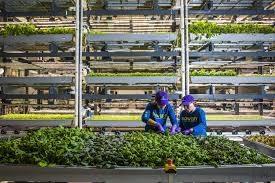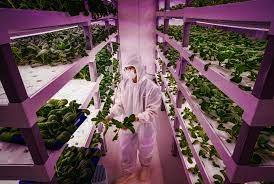 Heralded as a disrupter of conventional field cultivation of lettuce and other leafy vegetables, vertical farming has absorbed vast amounts of venture capital without any prospect of generating a return on investment.
Heralded as a disrupter of conventional field cultivation of lettuce and other leafy vegetables, vertical farming has absorbed vast amounts of venture capital without any prospect of generating a return on investment.
Advantages claimed for the vertical intensive system over conventional field cultivation include a reduced labor, freedom from pesticide and pathogen contamination, more efficient use of water and proximity to markets. These benefits come with high fixed costs including depreciation, interest, expensive management and fixed maintenance. Utility costs are extremely high, given the need to provide light for growing plants in addition to chemical additives for the substrate and high maintenance.
When I visited my first vertical farm in an industrial area near the metro area of a Southern city the installations and technology including racks, lighting and plumbing appeared impressive. A few questions relating to capital cost, utilities, yield, labor, unit revenue and volume of sales demonstrated non-viability. It appeared that the producer was operating on the old Henry Ford dictum of “losing money on every Model-T but making it up on the volume” My purpose in visiting the operation was to determine whether vertical farming could be applied to obsolete high-rise layer houses. The complexity of systems required confirmed that this would be infeasible. The question now is what use can be made of buildings designed and equipped for vertical farming. Unfortunately not for pullet or layer housing.
A study in 2020 by agronomists and agricultural economists at Cornell University projected that cultivating lettuce in an urban vertical farm generated a cost twice that of produce grown in Arizona and shipped to East coast metro areas. Informed observers consider that at present vertical farming companies are unprofitable and are surviving on injections of venture capital.
 During recent weeks, Fifth Season in Pennsylvania has ceased operation and has cancelled plans for a facility near Columbus, OH. App Harvest is in danger of collapse and Aero Farms has withdrawn from a listing based on losses that attained $39 million last year with only $5 million in revenue. In France, Agricool filed for bankruptcy protection and In Farm in Germany has reduced operations and furloughed personnel. It is becoming apparent that an estimated $2 billion invested to date in U.S. vertical farming may have been based on unrealistic projections of revenue and cost. Ultimately the market serves as the determinant of viability of a concept or innovation.
During recent weeks, Fifth Season in Pennsylvania has ceased operation and has cancelled plans for a facility near Columbus, OH. App Harvest is in danger of collapse and Aero Farms has withdrawn from a listing based on losses that attained $39 million last year with only $5 million in revenue. In France, Agricool filed for bankruptcy protection and In Farm in Germany has reduced operations and furloughed personnel. It is becoming apparent that an estimated $2 billion invested to date in U.S. vertical farming may have been based on unrealistic projections of revenue and cost. Ultimately the market serves as the determinant of viability of a concept or innovation.
There is, however, an ongoing demand for specialty vegetables and greens cultivated in both conventional and advanced greenhouses. Modern facilities that incorporate efficient ventilation offer most of the advantages of vertical farming without the high initial capital cost and the fixed and variable expenses.